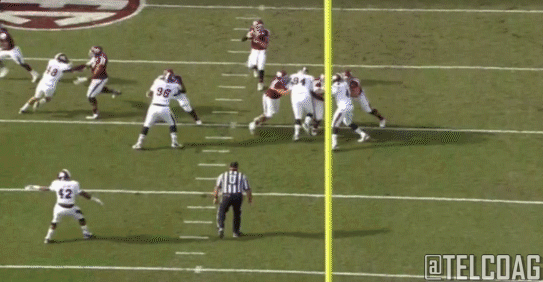The SEC has been an absolute powerhouse in college football and that is certainly true when it comes to showcasing elite NFL prospects. They’ve had countless first round picks and eventual Pro Bowl performers emerging from schools within that conference.
However, while the SEC has produced countless NFL linemen, running backs, wide receivers, defensive linemen, linebackers and defensive backs, the one position that they haven’t produced a ton of NFL talent at is quarterback.
Peyton Manning, Eli Manning, Matt Stafford, Jay Cutler and Cam Newton are the obvious exceptions but for a conference that just won seven straight national championships from 2006-2012, it’s pretty amazing that the SEC hasn’t produced more NFL quarterbacks – especially of late.
Here is a look at three key reasons why the SEC has struggled to produce NFL quarterbacks the same way that is has players at other positions.
The SEC Position Requirements
With the exception of the Manning brothers, Stafford, Cutler and Newton, there have been a ton of SEC quarterbacks that failed to continue their development once they started playing college football and part of the problem could be their situation on powerhouse teams.
The ability to run the football and play tough defense has been the priority for the top teams from the SEC while there is less of a demand on the quarterbacks to carry teams with their arms. The SEC has stressed the importance of running the football rather than spreading it out and passing, and that has been part of the problem with the development of quarterbacks.

Facing Tougher Competition
Think about Johnny Manziel throwing passes to Mike Evans at Texas A&M and being able to scramble with his legs or Alabama’s A.J. McCarron having the benefit of an elite run game and an elite wide receiver in Amari Cooper.
Then compare that to Tony Romo, Ben Roethlisberger and Joe Flacco trying to throw the ball to 5’9’’ wide receivers in tight windows and it’s really easy to understand the difference that these passers faced in terms of their overall development. Romo, Roethlisberger and Flacco improved dramatically because they had reps versus weaker competition.
That allowed them to succeed and continue their development – even though they were playing with worse talent. That doesn’t matter as college quarterback prospects need to develop and continue to build their confidence. That can be challenging in the SEC.
Early Commitments Not Panning Out
One of the biggest problems with the SEC and quarterbacks is how early they make their commitment to them. Quarterbacks are the first to commit and sometimes they can make their decision as early as two years in advance. With the recruiting in the SEC so fierce, it’s no surprise that they find so many future quarterbacks at a young age.
At the time, the SEC finds these quarterbacks, there are factors like size, arm strength and athleticism that factor the most into their decisions but there is a lot more that goes in to becoming a top passer. Sometimes the lack of development could be an issue. Missing on quarterbacks that develop later is also a problem and it’s clear the early recruiting is part of the problem.
[related_post_one]
Other Conferences Emphasize Offense
If you’re a quarterback, you’d probably want to play elsewhere. On one hand, it would be great if you could go to the SEC and succeed against the best talent in the country as well as the top defenses. However, those defenses can chew quarterbacks up and spit them out.
If you’re a quarterback who wants to play in a conference that emphasizes offense, pad stats and highlights scoring, a better option is a Pac-12 or the Big 12. Then they can rack it up in the box scores, look great on the highlights and start to get in the conversation for annual accolades.
There are much better options than playing in the rugged SEC, which hasn’t had a good recent track record of producing stars.


